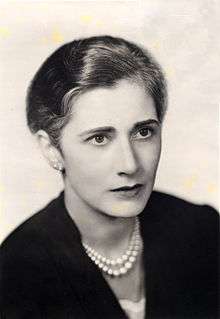Edna F. Kelly
| Edna Kelly | |
|---|---|
 | |
| Secretary of the House Democratic Caucus | |
|
In office January 7, 1964 – January 3, 1965 | |
| Leader | John McCormack |
| Preceded by | Leonor Sullivan |
| Succeeded by | Leonor Sullivan |
|
In office January 3, 1953 – January 3, 1957 | |
| Leader | Sam Rayburn |
| Preceded by | Chase Woodhouse |
| Succeeded by | Leonor Sullivan |
| Member of the U.S. House of Representatives from New York's 12th district | |
|
In office January 3, 1963 – January 3, 1969 | |
| Preceded by | Hugh Carey |
| Succeeded by | Shirley Chisholm |
| Member of the U.S. House of Representatives from New York's 10th district | |
|
In office November 8, 1949 – January 3, 1963 | |
| Preceded by | Andrew Somers |
| Succeeded by | Emanuel Celler |
| Personal details | |
| Born |
August 20, 1906 East Hampton, New York, U.S. |
| Died |
December 14, 1997 (aged 91) Alexandria, Virginia, U.S. |
| Political party | Democratic |
| Spouse(s) | Edward Kelly |
| Alma mater | Hunter College |
Edna Flannery Kelly (née Flannery) (August 20, 1906 – December 14, 1997) was a Democratic member of the United States House of Representatives from New York.
Kelly was born in East Hampton, New York. She graduated from Hunter College in 1928. She was a delegate to the 1948 Democratic National Convention, 1952 Democratic National Convention, 1956 Democratic National Convention, 1960 Democratic National Convention, and 1968 Democratic National Convention. She was elected to Congress in 1949 to fill the vacancy caused by the death of Andrew L. Somers and served from November 8, 1949 until January 3, 1969. She was part of the Democratic National Committee from 1956 until 1968.
Throughout her 19-year career in the House, Kelly was recognized for her expertise in foreign affairs, serving as the chair of the Subcommittee on Europe and retiring from Congress as the third ranking member of the House Committee on Foreign Affairs. During her tenure, Kelly was responsible for measures that settled displaced people after World War II and refugees for Russia and Eastern Europe. She also helped to create the United States Arms Control and Disarmament Agency.
Early in the 1950s, she was among the first in Congress to advocate for a tax reduction for low-income single parents left with the sole responsibility of caring for their dependent children. Congresswoman Kelly called attention to the inequity in the Tax Code that permitted business deductions for entertainment, but none for child care. Her proposal became part of the Internal Revenue Code of 1954.
Kelly can also be credited with promoting the first equal pay for equal work bill, which she introduced in 1951. It was a landmark effort, which established a new era in the fight for women's equality. She was in attendance when President John F. Kennedy signed the Equal Pay Act into law June 10, 1963.
She received numerous awards, including the Mother Gerard Phelan Award from Marymount College; an honorary doctorate from Russell Sage College; and her alma mater Hunter College's highest honor, the Centennial Medal.
She was married to New York City Court Justice Edward L. Kelly of Brooklyn, who died in 1942.
Kelly died in Alexandria, Virginia of cancer and a series of strokes at the age of 91. She had two children, eight grandchildren and 17 great-grandchildren.
Sources
- United States Congress. "Edna F. Kelly (id: K000070)". Biographical Directory of the United States Congress.
| United States House of Representatives | ||
|---|---|---|
| Preceded by Andrew Somers |
Member of the U.S. House of Representatives from New York's 10th congressional district 1949–1963 |
Succeeded by Emanuel Celler |
| Preceded by Hugh Carey |
Member of the U.S. House of Representatives from New York's 12th congressional district 1963–1969 |
Succeeded by Shirley Chisholm |
| Party political offices | ||
| Preceded by Chase Woodhouse |
Secretary of the House Democratic Caucus 1953–1957 |
Succeeded by Leonor Sullivan |
| Preceded by Leonor Sullivan |
Secretary of the House Democratic Caucus 1964–1965 | |